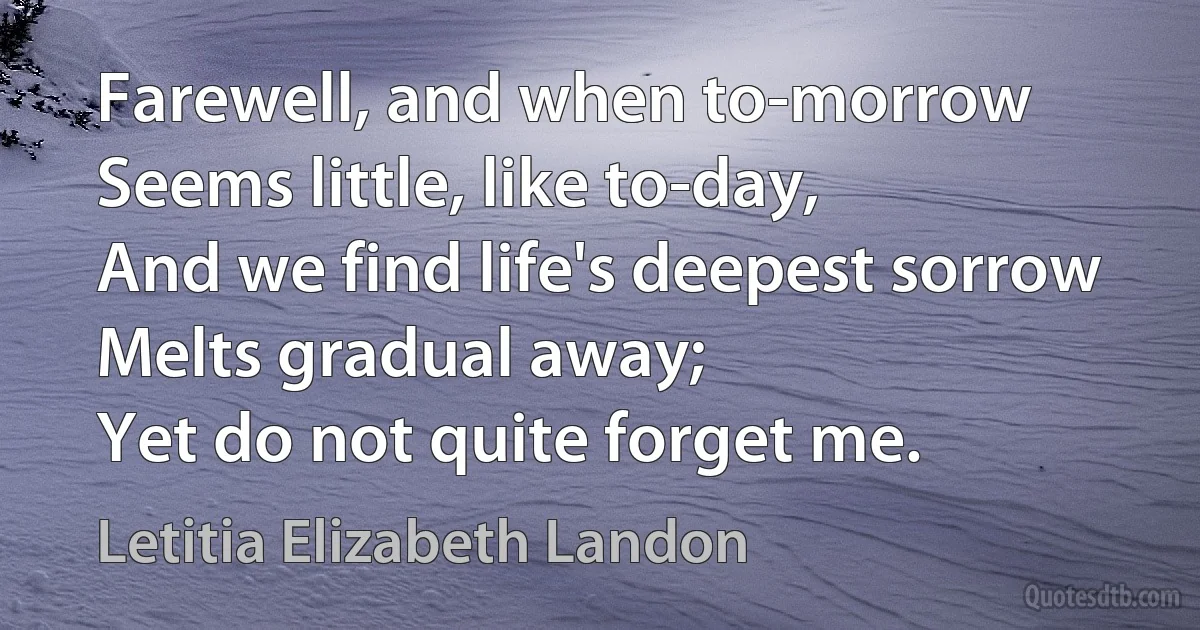Sorrow Quotes - page 28
No man ever enters into the feelings of a woman, let his kindness be what it may; they are too subtle and too delicate for a hand whose grasp is on "life's rougher things." They require that sorrow should find a voice; now the most soothing sympathy is that which guesses the suffering without a question.

Letitia Elizabeth Landon
How deep, how merciless, the love represt,
That robs the silent midnight of its rest;
That sees in gather'd crowds but one alone;
That hears in mingled footsteps only one;
That turns the poet's page, to only find
Some mournful image for itself design'd;
That seeks in music, but the plaining tone
Which secret sorrow whispers is its own!

Letitia Elizabeth Landon
Youth's first acquaintance with sorrow is a terrible thing-before time has taught, what it will surely teach, that grief is our natural portion, at once transitory and eternal. But the first lesson is the severest-we have not then looked among our fellows, and seen that suffering is general ; and we feel as if marked out by fate for misery that has no parallel.

Letitia Elizabeth Landon
[From Reginald Clinton]: I do not believe that the heart is turned from the Creator by enjoying his works. Of what avail is the sweet breath of the rose, the morning song of the lark ? The pleasure they impart is not matter of necessity, and yet we delight in both. The soul of the poet is as much His gift as the fragrance of the flower, or the lay of the bird ; and the page where inspired words record heroic deed, touching sorrow, or natural loveliness, is one of those pleasures for which we should be thankful. I, for my part, believe most devoutly in the Almighty mercy, when I see how much that is beautiful and gladdening has been scattered over our pilgrimage here.

Letitia Elizabeth Landon
... happiness is not for this world - a conviction that cannot be too soon acquired : it will destroy a thousand vain expectations, dissipate the most perplexing of our illusions - the early knowledge that life is but a trial, whose triumph is hereafter, and this earth a place appointed for that sorrow and patient endurance which is gradually fitting us for a better and a happier state.

Letitia Elizabeth Landon
The history of most fictions would be far stranger than the fictions themselves ; but it would be a dark and sad chronicle. Half the works that constitute the charm of our leisure, that give their own interest to the long November evening, or add to the charm of a summer noon beneath the greenwood tree, are the offspring of poverty and of pain. ... How often is the writer obliged to put his own trouble, his suffering, or his sorrow aside, to finish the task ! The hand may tremble, the eyes fill with unbidden tears, and the temples throb with feverish pain, yet how often is there some hard and harsh necessity, which says, "the work must be done.”.

Letitia Elizabeth Landon
People are born in sorrow and move about the earth in patterns of sorrow without sense and without plan. Why should I take myself so seriously? I am no more important to the Creator than the trees or the vegetation which live with me on His earth. There is no eye to watch over me nor a hand to direct me, and there will be no preferred fate for me at the end, no matter what I am, or what I do with my life.

William March
The first step is the last step. The first step is to perceive, perceive what you are thinking, perceive your ambition, perceive your anxiety, your loneliness, your despair, this extraordinary sense of sorrow, perceive it, without any condemnation, justification, without wishing it to be different.

Jiddu Krishnamurti
We have been told that all paths lead to truth - you have your path as a Hindu and someone else has his path as a Christian and another as a Muslim, and they all meet at the same door - which is, when you look at it, so obviously absurd. Truth has no path, and that is the beauty of truth, it is living. A dead thing has a path to it because it is static, but when you see that truth is something living, moving, which has no resting place, which is in no temple, mosque or church, which no religion, no teacher, no philosopher, nobody can lead you to - then you will also see that this living thing is what you actually are - your anger, your brutality, your violence, your despair, the agony and sorrow you live in. In the understanding of all this is the truth, and you can understand it only if you know how to look at those things in your life. And you cannot look through an ideology, through a screen of words, through hopes and fears.

Jiddu Krishnamurti
I understand of what a great tribune's sorrow is made; and I can only dream of him who, visibly summarizing the immense crisis of human necessity in a work which forgets nothing, which seems to forget nothing, without the blot even of a misplaced comma, will proclaim our Charter to the epochs of the times in which we are, and will let us see it.

Henri Barbusse
In his seminar on The Ethic of Psychoanalysis, Lacan speaks of the role of the Chorus in classical tragedy: we, the spectators, came to the theatre worried, full of everyday problems, unable to adjust without reserve to the problems of the play, that is to feel the required fears and compassions - but not problem, there is a chorus, who feels the sorrow and the compassion instead of us - or, more precisely, we feel the required emotions through the medium of the chorus: 'You are then relieved of all worries, even if you do not feel anything, the Chorus will do so in your place.

Slavoj Žižek
When I realize that she is gone, perhaps gone forever, a great void opens up and I feel that I am falling, falling, falling into deep, black space. And this is worse than tears, deeper than regret or pain or sorrow, it is the abyss into which Satan was plunged. There is no climbing back, no ray of light, no sound of human voice or human touch of hand.

Henry Miller



